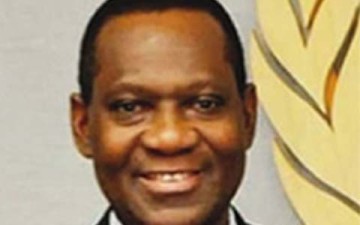Despite all the media coverage over the intention of the British Government to start the imposition of 3,000 Pounds in November on Visitors from Nigeria, Minister of Foreign Affairs, Ambassador Olugbenga Ashiru, yesterday, said the Federal Government was yet to receive any official statement from its British counterpart over the 3,000 Pounds Sterling cash bond for first-time visa applicants from Nigeria and five other Commonwealth countries.
The other countries are India, Kenya, Sri Lanka, Pakistan and Bangladesh.
A statement by the ministry’s spokesperson, Ogbole Ode, said: “Federal Government has already conveyed its objection to the bond payment to the UK government “If and when a communication to that effect is received, Federal Government will take appropriate steps to reflect its national interest.” In which the Federal Government on Tuesday insisted on retaliatory action against British citizens if their government goes ahead .
It expressed displeasure that Downing Street, which had already set November as the discriminatory policy’s commencement time, had not deemed it neccessary to formally communicate to it on the next step of action.
The Minister of Foreign Affairs, Ambassador Olugbenga Ashiru, had at a meeting with the British High Commissioner, Andrew Pocock, conveyed the desire of Nigeria to retaliate the policy.
The spokesperson for the ministry, Ogbole Ode, said in a statement in Abuja, that the British authorities were already aware of the Federal Government’s position on the matter.
The statement reads, “Media reports in Nigeria on Monday, July 29, 2013, indicated that the United Kingdom Government will begin to implement from November, 2013, the £3,000 cash bond for first-time visa applicants from Nigeria, and five other Commonwealth countries. The other countries are India, Kenya, Sri Lanka, Pakistan, and Bangladesh. These media reports themselves were quoting the Financial Times of London.
“The Ministry of Foreign Affairs has yet to receive any official communication on the final decision of the UK government on this matter. The Federal Government has already conveyed its objection to the bond payment to the UK government. This was done when the Minister of Foreign Affairs, Ambassador Ashiru, summoned the British High Commissioner to Nigeria, Mr. Andrew Pocock, to the Tafawa Balewa House, on June 25, 2013.
“If and when a communication to that effect is received, the Federal Government will take appropriate steps to reflect its national interest. ”
When contacted, the spokesman for the British High Commission in Abuja, Rob Fitzpatrick, said, “No final decision has been made” on the controversial policy.
He said, “As British Prime Minister David Cameron has said, we want the brightest and the best to help create the jobs and growth that will enable Britain to compete in the global race. So, for example, if you are an overseas businessman seeking to invest and trade with world class businesses, one of the thousands of legitimate students keen to study at our first-class universities or a tourist visiting our world class attractions, be in no doubt: Britain is open for business.”
It will be recalled that Ashiru, at the meeting with Pocock, warned that the government would retaliate the discriminatory policy.
On Monday the British government defended a campaign advising illegal immigrants to “go home or face arrest.”
Two trucks, each displaying a large poster with a number for migrants to send text messages if they desired to return to their countries , were seen in six London boroughs for a week.
It was learnt that posters, leaflets and advertisements in newspapers would run for a month to further promote the campaign, a pilot scheme by the interior ministry.
A member of the Liberal Democrat Party, the junior partner in the coalition government with the Conservative Party and Business Secretary, Vince Cable, called the campaign “stupid and offensive.”
The opposition Labour Party’s home affairs spokeswoman, Yvette Cooper, also said the scheme was “ludicrous.”
But Prime Minister David Cameron’s spokesman defended the campaign, saying it was clear that it was “already working” as some illegal immigrants had voluntarily agreed to leave the UK

